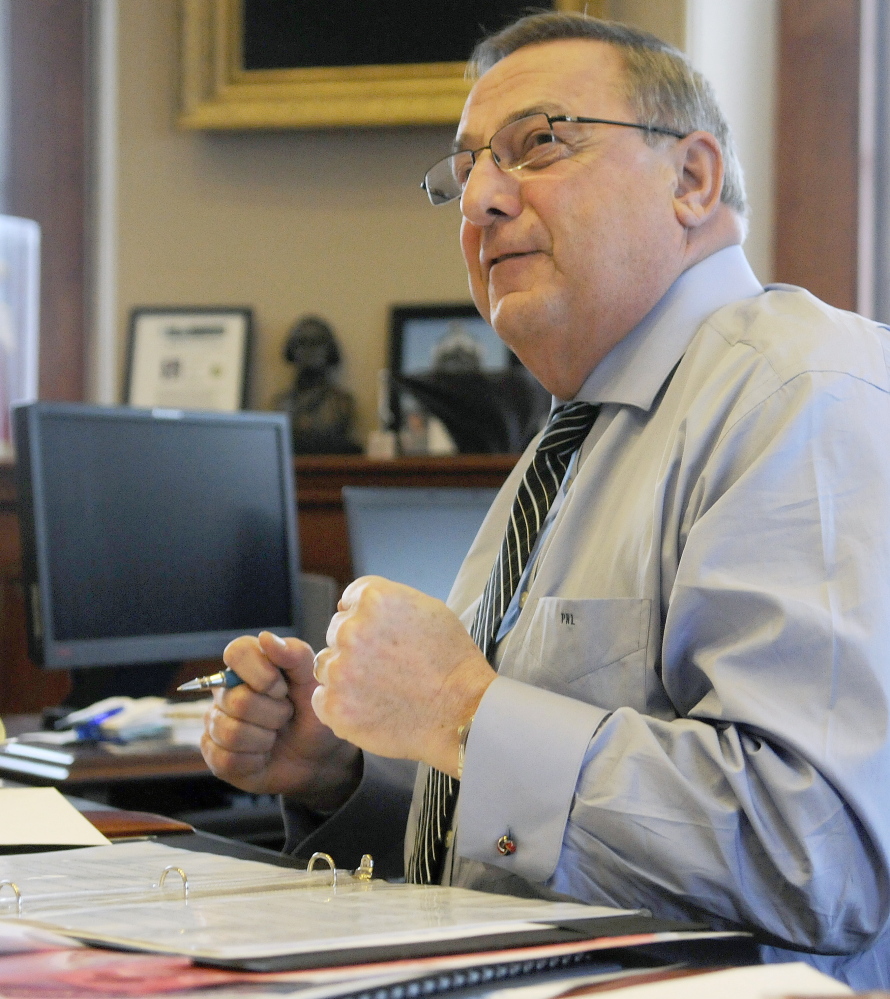Gov. Paul LePage will outline his ambitious tax reform and budget proposals in a State of the State address Tuesday and then take his message on the road to build the support among voters that he likely will need to convince leery lawmakers.
The Republican’s staff declined to discuss specifics ahead of the speech, but said the governor planned to be “the face of his budget” in the coming weeks as he makes the case to the general public for the complicated, controversial tax code overhaul that has created considerable discomfort within his own party. In so doing, LePage appears to be trying to expand the debate over his $6.3 billion budget beyond the halls of the State House to Main Street.
“After the State of the State address, he will be out in the public speaking about this, and Mainers will have an opportunity to see the governor in action and ask him questions,” said LePage spokeswoman Adrienne Bennett. “He is going to be the face of his budget and he wants to be able to talk with Mainers because he knows that, yes, there is shared sacrifice in this budget, but there are also opportunities for them to keep more of their own money.”
LePage surprised lawmakers from both parties when he revealed a two-year budget proposal Jan. 9 that would cut income taxes, reduce the corporate tax and eliminate the estate tax, while increasing Maine’s sales tax and extending it to hundreds more goods and services. The budget is raising concern among municipal officials because LePage also wants to eliminate revenue sharing and cushion the financial blow by authorizing towns to start collecting property taxes from larger nonprofit groups.
The governor is expected to discuss those proposals – as well as “his vision for the state,” Bennett said – during a 7 p.m. speech to a joint session of the Legislature that will be carried live by the stations of the Maine Public Broadcasting Network.
POLITICKING ON MAIN STREETS
Although details weren’t available Monday, the governor’s plan for post-speech public appearances sounds similar – but not identical – to the statewide “Capital for the Day” tour he held in winter 2011, when he spoke at events in at least 15 of Maine’s 16 counties. During those events, LePage and several commissioners of state agencies addressed sometimes-large crowds before answering questions from the audience.
The statewide tour also is similar to the campaign-style stump appearances that presidents typically make around the country to bolster public support for their budgets or the policies outlined in their State of the Union speeches.
Such Main Street politicking could be useful for LePage this year as he tries to build support within Republican ranks for a budget that contains both tax cuts and tax increases, said Mark Brewer, a political science professor at the University of Maine. Often the best way to sway noncommittal or undecided legislators is to convince their constituents to make the governor’s case for him, thereby providing lawmakers with political “cover” to support a tax proposal they might otherwise oppose, Brewer said.
“I think it is even more important in this case because the governor’s budget, as proposed, is such a dramatic change from business as usual in Maine,” Brewer said. “We are hearing from a lot of Republican legislators who are very uneasy about this budget … so he needs to go out and sell this proposal, and not only sell it to local leaders but sell it to regular Mainers.”
FLESHING OUT COMPLEX PROPOSALS
To date, the LePage administration has released plenty of talking points, but relatively few specifics about how the average Maine resident or household would be affected by his tax proposals. Several organizations and news outlets have tried to fill in that information gap with their own analyses of how LePage’s proposals would affect taxpayers, municipalities and nonprofits facing possible taxation for the first time.
The governor will provide some new information Tuesday, Bennett said, but the administration’s more detailed analysis of the tax proposals will likely be released in the week after the speech.
“We want Mainers to understand this (budget),” Bennett said. “We know this is complex.”
PRESSURING THOSE WHO RESIST
Both Republican and Democratic state lawmakers have been unusually quiet about the governor’s budget proposal, which will likely be rewritten substantially by a Legislature where Republicans control the Senate and Democrats hold a majority of House seats.
Republicans, while embracing the proposed tax cuts, could find themselves pressured by LePage to vote for a sales tax increase and expansion similar to a Democrat-led proposal that voters overturned at the ballot box in 2010. Although he claims to dislike politics, LePage has proven adept at using his office to pressure lawmakers from both parties – particularly Republicans – to support his policies, and stated on several occasions last month that he views his budget as a potential referendum on 2016.
Democrats, meanwhile, may support some of the tax proposals, but are expected to fight LePage’s welfare and social services initiatives. Adding to the governor’s challenge are lawmakers on both sides of the aisle who represent the small or rural communities where municipal officials are raising alarms that his proposal to eliminate revenue sharing could result in higher property taxes.
Send questions/comments to the editors.




Success. Please wait for the page to reload. If the page does not reload within 5 seconds, please refresh the page.
Enter your email and password to access comments.
Hi, to comment on stories you must . This profile is in addition to your subscription and website login.
Already have a commenting profile? .
Invalid username/password.
Please check your email to confirm and complete your registration.
Only subscribers are eligible to post comments. Please subscribe or login first for digital access. Here’s why.
Use the form below to reset your password. When you've submitted your account email, we will send an email with a reset code.